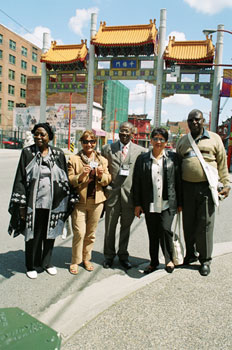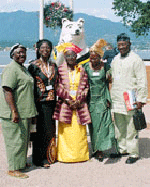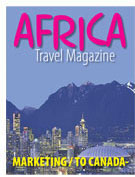|
|
|
Outside
the Box.
Benefits
of Civic Tourism .
UN
World Urban Forum
. Globe2008
- Cities Job Creation Starts
Here... The Quest for innovative
ideas and practical solutions - rare for a meeting convened
by the United Nations - was underscored in the six
Dialogues, 13 Roundtables and more than 160 Networking
Events, Ministers, mayors, academics, community-based
organizations, federations of non-governmental
organizations, and the private sector shared their insights
and experiences on what would improve the quality of life in
the world's growing cities. The inclusive approach followed
at the Forum is a model for cities. Some are already
following this model while others would benefit from doing
so. It was promising that
participants, in such large numbers and from all walks of
society, began to converge towards an outline for the way
forward: They agreed on the need
for all urban players - citizens, local governments, state
and provincial governments, national governments, the
private sector and civil society organizations - to work
harder to solve urban problems and challenges. There was
widespread agreement that they all must do their part,
rather than simply transfer responsibility to
others. They agreed that
risk-taking and the pursuit of innovation must characterize
municipal leadership it cities are to achieve sustainable
development. Vancouver's example in taking the lead in such
areas as air and water quality, public transit and planning
was mentioned often in this context. They agreed on the
importance of transparency and accountability. Citizens need
to be informed of challenges and steps taken by governments
to address them. Transparency goes hand-in-hand with
accountability, which speeds up the process of enhancing
actions that work and curtailing those that do not
work. The spirit and enthusiasm
evinced at the Forum in formal and in the Interstices are
difficult to capture in words. But it was very clear that
ev FACES AND VOICES OF
AFRICA AT THIS EVENT SPEAKERS
FROM AFRICA Ali Mohamed Shein:
Vice President, Government of Tanzania Harriette Amissah
ArthurL Director, KITE, Ghana Mary Balikungeri:
Rwanda Women's Network, Rwanda Tasneem Essop:
Minister of Environment, Planning and Economic Development,
Government of the Western Cape, South Africa Eric Falt: Director
of the Division of Communications & Public Information,
United Nations Environment Programme (UNEP),
Kenya Bhekokwakhe Hamilton
Cele: Transport Safety and Community Liaison Officer,
KwaZulu Natal, South Africa Lamine Mbassa:
Director of Economic and Financial Affairs,
Communauté Urbaine de Douala (CUD),
Cameroon Jean-Pierre Mbassi:
Secretary General, United Cities & Local Governments
Africa Smangaliso Mkhatshwa
: Councillor of Tshwane, South Africa Abbès Mohsen:
Mayor of Tunis, Tunisia; President of the Féderation
Nationale des Villes Tunisiennes, Tunisia Rose Molokoane: South
African Homeless People's Federation, South
Africa Maria Mutagamba:
Minister of State for Urban Employment & Poverty
Alleviation, Government of Uganda, Uganda John Pombe Magufuli :
Minister of Housing, Lands and Human Settlements, Government
of Tanzania, Co-Chair WUF 3 Lindiwe Sisulu:
Minister of Housing, Government of South Africa Local
examples of sustainability AFRICA
MUNICIPAL DEVELOPMENT
PARTNERSHIP
 Since
1975 our association (ATA) has been hosted by over 30
African Cities, and Africa Travel Magazine has enjoyed a
special relationship with key individuals in numerous
cities, towns and villages. Today, thanks to the UN World
Urban Forum we have had a rare opportunity -- getting to
know and learn about mayors, administrators, professionals
and personalities from many African communities. That is why
we have decided to launch a special edition on Africa's
Gateway Cities in print and DVD, and to make WUF3 the
springboard to an ongoing series on this website. One of the
meaningful comments I heard at the event that struck a chord
with me was, "There is no closure."
Since
1975 our association (ATA) has been hosted by over 30
African Cities, and Africa Travel Magazine has enjoyed a
special relationship with key individuals in numerous
cities, towns and villages. Today, thanks to the UN World
Urban Forum we have had a rare opportunity -- getting to
know and learn about mayors, administrators, professionals
and personalities from many African communities. That is why
we have decided to launch a special edition on Africa's
Gateway Cities in print and DVD, and to make WUF3 the
springboard to an ongoing series on this website. One of the
meaningful comments I heard at the event that struck a chord
with me was, "There is no closure."  n
other words, even though the conference has ended the spirit
of 'habitat' lives on - and our media group plans to keep
that spirit alive and active. Readers with comments in this
vital area are invited to write. Cities
of Africa.
The Africa Travel Association's Canada Chapter, of which
myaelf and Muguette Goufrani are members, had an added
opportunity- that of taking two different groups of African
mayors on an escorted tour of Vancouver, an unforgettable
experience. We intend to keep these friendships active and
to visit each of the mayors in their respective countries
sometime soon
n
other words, even though the conference has ended the spirit
of 'habitat' lives on - and our media group plans to keep
that spirit alive and active. Readers with comments in this
vital area are invited to write. Cities
of Africa.
The Africa Travel Association's Canada Chapter, of which
myaelf and Muguette Goufrani are members, had an added
opportunity- that of taking two different groups of African
mayors on an escorted tour of Vancouver, an unforgettable
experience. We intend to keep these friendships active and
to visit each of the mayors in their respective countries
sometime soon
Jerry W. Bird, Editor  Summary
of WUF3
Summary
of WUF3
With some 10.000
participants from over 100 countries, the Third Session of
the World Urban Forum paved the way for a new drive forward
on the international urban agenda in a world of rapidly
growing cities. Just as the Habitat I Conference in
Vancouver in 1976 placed local community concerns on the
international agenda and highlighted the critical importance
of inclusiveness, the Forum in Vancouver, 30 years later,
lived up to its promise of moving ideas to action. It
symbolized inclusiveness, with balanced participation from
public, private and civil society sectors. Compared to
previous sessions of the Forum, there was a notable increase
in private sector participation. They
agreed that appropriate engagements, partnerships and
relationships need to be build in an inclusive manner to
better understand challenges and develop practical
solutions. Participants from many parts of the world
presented examples that can serve as guideposts for these
strategies.
They
agreed that appropriate engagements, partnerships and
relationships need to be build in an inclusive manner to
better understand challenges and develop practical
solutions. Participants from many parts of the world
presented examples that can serve as guideposts for these
strategies.
The conference speaker list included many high profile
Africans. Here are just some of the people who shared their
expertise and experience with participants at
WUF3:
Contact numbers and some
biographies available.
Examples of urban sustainability were just outside the doors
of WUF3. Delegates saw how a waste water treatment plant
works or cycle around the University of British Columbia
campus. Free guided tours took them off the tourist track to
see why Vancouver is one of the most sustainable cities on
the planet.
RELATED
LINKS
WORLD
MAYOR AWARDS- AFRICA;
Finalistgs 2006: Mayor of Antananarivo, Madagascar;
Johannesburg, South Africa; Maputo, Mozambique; Tunis,
Tunisia
Under the current local government reforms in Africa, Mayors
and Councillors are key actors in establishing strong and
sustainable local governments. They have a dual role of
democratising local government and fostering local
development. They represent the citizens and are supposed to
provide both political and economic leadership; have an
appreciable level of civic knowledge with the ability to
manage public affairs; and create an environment for
maintenance of peace and security in their jurisdiction.
However, until the late 1980s, it was never conceived that
representation of ordinary people requires a mayor or a
councillor to have extraordinary skills. This was possibly
due to the fact that their engagement was on a part time
basis and for a fixed term of one or two years. Many elected
officials come to local authorities without prior management
skills or knowledge of local government systems, or
knowledge of national priorities and goals. MORE-
MAYOR'S
OUVERHAUL OF ADDIS ABABA:
Executive Mayor Arkebe Oqubay

